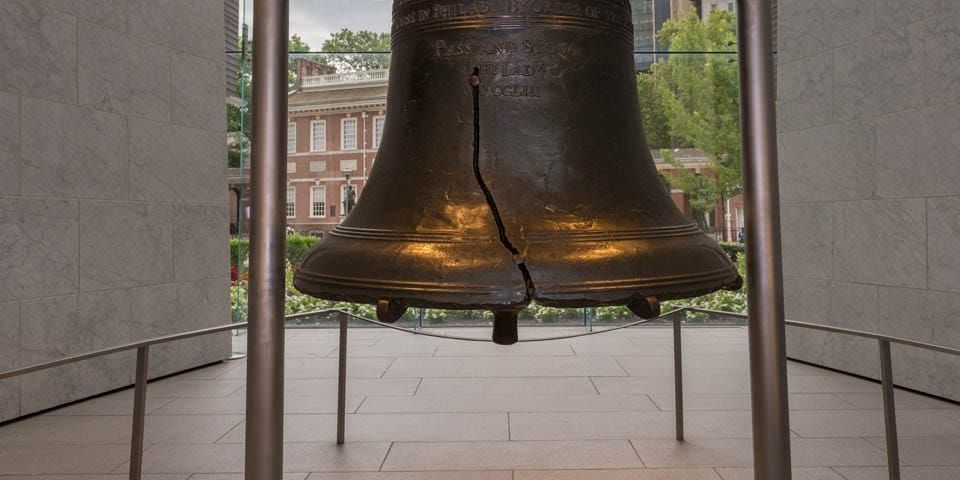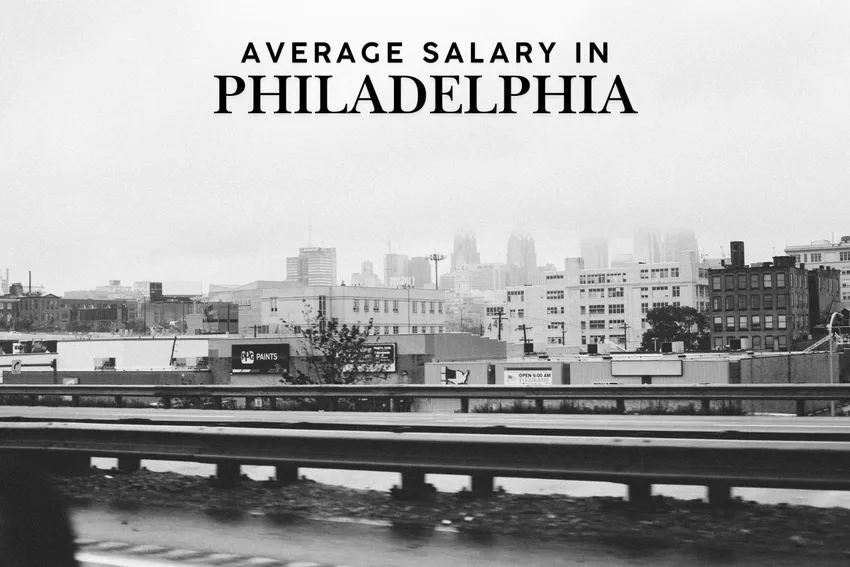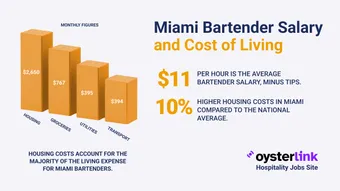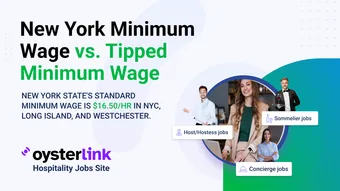Average Salary Philadelphia: 3 Key Takeaways
- Entry-level hospitality workers typically earn $13–$16/hour, while skilled roles command much higher salaries.
- With a base wage of $2.83/hour, Bartenders and Servers in high-traffic neighborhoods can make $20–$30/hour or more.
- A one-bedroom apartment in Center City or Rittenhouse averages $1,400–$1,600/month.
Average salary in Philadelphia for hospitality and restaurant workers varies widely, shaped by role, experience, tipping potential, and location.
From $13/hour entry-level kitchen staff to $90K+ Hotel Managers, wages reflect both the city's diverse culinary scene and its growing demand for skilled labor.
Average Salary in Philadelphia for Hospitality Jobs
BLS data offers a reliable snapshot of average wages across a broad spectrum of occupations, including those central to the hospitality and restaurant industries.
While these figures typically lag by a year or more, they serve as a valuable reference for understanding broader labor market trends.
Understanding BLS Categories
The BLS typically groups jobs under categories like “Food Preparation and Serving-Related Occupations” or “Accommodation and Food Services.”
In a city as large and diverse as Philadelphia, these categories encompass both small family-owned venues and upscale, high-volume businesses.
To avoid skewed perspectives, it’s useful to look for more localized data at the county or metropolitan division level, focusing on the Philadelphia metropolitan area.
Moreover, the BLS makes distinctions between hourly and annual wages, which is particularly important for hospitality roles.
Employees in lodging management or upscale restaurants might earn an annual salary, while entry-level kitchen staff typically work hourly.
Average Hourly Wages
According to recent BLS estimates food service workers in the Philadelphia area earn an average of $13 to $16 per hour, excluding tips.
For specialized roles—such as Chefs, Chef de Partie with niche training, or Sommeliers—this figure can climb.
Positions such as Hotel Front-Desk Clerks or Concierge staff can see hourly wages start around $14 to $18.
Lodging managers bring in annual salaries averaging between $60,000 and $70,000 in the Philadelphia region, with potential for performance-based bonuses.
Tipped Occupations
BLS data for tipped roles can be tricky to parse.
In Pennsylvania, the minimum cash wage for tipped workers is $2.83 per hour, but employers must ensure that the total meets or exceeds $7.25 per hour.
In busy neighborhoods like Center City or Fishtown, experienced Servers or Bartenders can see their combined hourly rate climb to $18–$25 or even $30 on peak nights.
In contrast, establishments with slower traffic may struggle to ensure staff consistently earn an amount above the minimum wage after tips.
While employers are legally obligated to make up any shortfall, enforcement can vary, emphasizing the importance of compliance with labor laws.
Philadelphia Restaurant Wages by Role
Given Philadelphia’s diversity of restaurants and a steady flow of tourists, compensation structures can differ widely.
Below are some commonly observed ranges for key roles, combining insights from BLS data, local reports, and anecdotal evidence from industry professionals.
Servers and Bartenders
- Servers: Typically start with a tipped minimum wage of $2.83 per hour in Pennsylvania.
- Bartenders: The effective hourly rate might range from $20 to $30, with potential for more in busy or high-end venues.
Cooks and Kitchen Staff
- Line Cooks: Generally command $13 to $20 per hour, depending on experience and the complexity of the menu.
- Sous Chefs: Often shift to a salaried model, with a range of $35,000 to $50,000 annually.
- Head Chefs: Can earn $50,000 to $80,000+ per year, particularly in acclaimed dining establishments.
Restaurant Managers and Hotel Managers
- Front-of-House (FoH) Managers: Salaries can start at $40,000 and climb to $60,000 or more.
- General Managers: These roles often offer $50,000 to $75,000 or higher, with performance bonuses sometimes included.
- Hotel General Managers: If operating large or luxury properties, GMs in Philadelphia can earn between $60,000 and $90,000.
Philadelphia Minimum Wage and Local Pay Trends
Philadelphia’s unique position within Pennsylvania dictates the legal minimum wage it can enforce.
While neighboring states have moved toward or already enacted a $15 minimum wage, Pennsylvania’s state minimum wage remains at $7.25.
Minimum Wage Issues
There have been ongoing debates in the state legislature about raising Pennsylvania’s minimum wage.
Supporters argue that an increase could better align pay with the rising cost of living, while opponents express concerns about potential job losses.
Because of state preemption laws, Philadelphia cannot impose a distinct local minimum wage for private businesses without Harrisburg’s approval.
Impact on Hiring and Retention
In practice, the tight labor market in hospitality pushes many employers to exceed the $7.25 base or to pay higher tipped minimum wages.
Turnover can be expensive in the restaurant and hotel industries, necessitating training and onboarding costs.
Offering higher wages, benefits, and scheduling flexibility can help mitigate these issues and cultivate a loyal workforce.
Local Legislation and Worker Advocacy
Philadelphia’s City Council has passed laws around scheduling transparency, paid sick leave, and fair workweek ordinances.
Nonetheless, they improve overall work conditions by ensuring consistent hours and preventing last-minute schedule changes that can disrupt workers’ personal lives.
Worker advocacy groups also play a pivotal role, pushing for policies that address wage theft, tip mismanagement, and other labor challenges.
Future Wage Outlook for Hospitality Jobs in Philadelphia
The hospitality and restaurant industry in Philadelphia is constantly evolving.
As the city recovers from recent economic disruptions, there has been a renewed focus on fair compensation, safe work environments, and employee well-being.
Post-Pandemic Landscape
Restaurants that survived the pandemic often did so by pivoting to online ordering, delivery services, and outdoor dining.
As in-person dining has largely rebounded, many establishments now face staffing shortages.
To compete for qualified candidates, some have raised starting wages, offered signing bonuses, or provided more robust benefits packages.
This trend could lead to a gradual upward shift in the average salary in Philadelphia across hospitality roles.
Competitive Environment
With more restaurants and hotels opening or reopening, the demand for skilled Cooks, Bartenders, and managers outstrips the supply at times.
Highly experienced hospitality professionals, particularly those with fine-dining or high-volume expertise, can negotiate higher compensation packages.
This is also true for specialized roles like Pastry Chefs, Mixologists, or Event Coordinators who cater to niche markets.
Career Development
Philadelphia’s strong food culture, combined with local mentorship programs and culinary incubators, encourages workers to deepen their knowledge and aim for career progression.
Aspiring Chefs can develop signature dishes in pop-up kitchens or partner with established restaurateurs for a joint venture.
For those interested in the lodging sector, Philadelphia’s many boutique and chain hotels provide ample on-the-job training.
Philadelphia Hospitality Industry Overview
Philadelphia’s hospitality and restaurant industry forms a vital pillar of the city’s economy, employing tens of thousands of individuals in a wide range of positions.
These roles include:
Beyond the job opportunities, the city’s unique gastronomic heritage keeps local and visiting diners excited about discovering new places to eat and gather.
Growth and Significance
Philadelphia’s historical importance and cultural diversity attract a steady influx of domestic and international tourists.
Visitors come to see landmarks such as the Liberty Bell and Independence Hall, attend large conventions, or cheer on Philadelphia’s professional sports teams.

The resulting tourism revenue flows into the city’s bars, restaurants, and hotels, supporting a robust hospitality sector.
Over the past decade, the city has also experienced a culinary renaissance—spurred by innovative Chefs, restaurateurs, and food entrepreneurs.
This rise in demand for unique dining experiences spurs continuous growth, leading to higher staffing needs and, in some cases, more competitive wages for those with specialized skill sets.
Impact on Employment
The accessibility of entry-level roles in restaurants and hotels makes this sector a gateway for many workers.
From fast-casual eateries to upscale hotels, new hires can develop skills and build a career path in management or specialized cuisine.
Hospitality and restaurant careers also encourage entrepreneurial ambitions, with many aspiring professionals launching food trucks, small cafés, or pop-up events.
Despite this accessibility, it is crucial to understand that wages can vary dramatically based on an establishment’s size, location, and prestige.
Average salary in Philadelphia varies widely by hospitality segment and location, with shifts between areas like South Philly and Center City significantly impacting pay and tips.
Cost of Living Philadelphia: What Hospitality Workers Should Expect
No discussion of the average salary in Philadelphia is complete without analyzing the cost of living in the city.
While Philadelphia remains more affordable than major nearby cities like New York or Washington, D.C., it still tends to exceed national averages in several key categories.
- Housing Costs: A one-bedroom in Center City or Rittenhouse averages $1,400–$1,600, exceeding $2,000 in upscale spots.
- Transportation: A monthly SEPTA pass costs just over $100, making public transit a viable option for many hospitality workers.
- Other living expenses: Basic utilities and internet commonly add $150 to $300 to monthly costs, based on personal usage.
- Healthcare: Philadelphia offers top-tier medical care, but insurance premiums can be high for those without employer coverage.
For hospitality workers, cutting rent costs through shared housing or affordable neighborhoods is often essential.
Conclusion: Understanding Philadelphia Restaurant Wages
Philadelphia’s hospitality industry is a key part of the city’s identity, with the average salary in Philadelphia shaped by both cultural richness and economic forces.
Although Pennsylvania’s minimum wage remains at $7.25 ($2.83 for tipped workers), a competitive labor market is driving some employers to pay above that baseline.
For hospitality professionals, Philadelphia offers strong growth potential, fueled by a vibrant dining culture, steady tourism, and new business ventures.
With rising demand for talent, the average salary in Philadelphia’s hospitality sector is expected to continue climbing.









Loading comments...